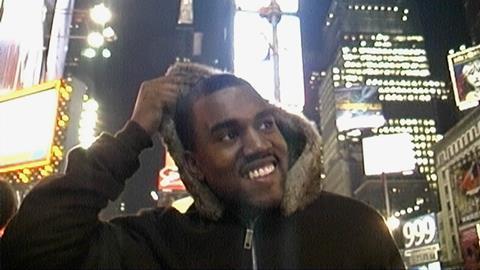Netflix doc gets up close and personal with Kanye West over three decades and three episodes

Dirs: Coodie Simmons, Chike Ozah. US. 2022. 277 mins.
An engrossing, ultimately moving portrait of an artist told by someone in his inner circle since the start, Jeen-Yuhs takes us back to the early days of Kanye West’s meteoric rise, which are contrasted sharply with his troubled recent years. Co-director Coodie Simmons first trained his camera on the Chicago rapper in 1998, conceiving a Hoop Dreams-like chronicle that would follow West as he pursued his creative aspirations, and the results are an intimate origin story that also doubles as a cautionary tale. This three-part documentary series, which focuses in large part on the making of West’s breakthrough 2004 debut The College Dropout, will remind longtime fans why he once seemed so revolutionary — and then force them to confront the personal struggles that subsequently derailed his career.
Although it’s a cliche, Jeen-Yuhs legitimately gives the sense of watching a star being born.
The first segment screens as part of Sundance, with the full series streaming on Netflix starting on February 16. Jeen-Yuhs will be a must-see for the faithful, who will relish every behind-the-scenes moment Simmons captured over the course of 20 years.
Simmons, who also narrates, explains that he was an aspiring comedian before realising that his Chicago public-access show was tapping into the city’s pool of unheralded hip-hop talents. Becoming friendly with the 21-year-old Kanye West, he takes the rapper up on his offer to follow him to New York, serving as West’s documentarian as he seeks a record deal.
Each of Jeen-Yuhs’ three chapters covers a crucial segment of West’s story: Act I is about his years before the record contract when he’s crafting beats for other rappers; Act II concerns The College Dropout and its triumphant aftermath; while Act III fast-forwards many years later when Simmons reconnects with West, who has profoundly changed in the interim.
Co-directing with his longtime creative partner Chike Ozah, Simmons tells West’s odyssey from his own perspective, his verite footage boasting an appealing roughness as the grinning, cocky young rapper works relentlessly to get signed. Viewed as a producer who didn’t have the skills to become a performer, West refused to be pigeonholed, and Simmons’ voiceover conveys his pride in his friend for believing in himself.
Eschewing talking-head interviews, Jeen-Yuhs immerses us into West’s world, and hip-hop aficionados will relish seeing him cross paths with everyone from Mos Def to Jay-Z. But the series also pulls back the curtain on his more unguarded moments, especially as he hangs out with his beloved mother Donda, who instilled a confidence in the rapper that sustained him. These warm, low-key interactions demonstrate their deep bond — and prepare the viewer for the inevitable tragedy of her 2007 death, which devastated him.
It’s remarkable how much material Simmons shot during West’s pre-fame years, including plenty of choice glimpses of the College Dropout period — not just in-the-studio sequences but also episodes at the orthodontist as he recovers from the 2002 car crash that nearly killed him. Act II recaptures the thrill of hearing indelible hits like ’Jesus Walks’ for the first time, and it’s hard to miss how impressed peers like Pharrell Williams are when they first hear these tracks, realising they’d underestimated his talent. Although it’s a cliche, Jeen-Yuhs legitimately gives the sense of watching a star being born.
Once West becomes a Grammy-winning sensation, leaving old associates like Simmons behind, the film picks up the story around 2016 when West invites him back into his orbit. After spending several hours with the young West, viewers will be taken aback by the musician they encounter during Jeen-Yuhs’ later stretches. As West himself admits, he’s gained weight because of medication, but the transformation is more spiritual than physical — and not because he’s renewed his devotion to God. Rather, he’s grown into a man whose ego and well-documented mental-health issues have taken their toll. Once again filming West in his day-to-day life, Simmons records private exchanges in which the rapper appears erratic, and the director’s anguished narration underlines his concern for the friend he once knew so well.
There will be those who tune in to Jeen-Yuhs either to relive West’s past glories or to seek clues for what has become of him. The documentary seeks to satisfy on both fronts, although the filmmakers perhaps try too hard to find a happy ending to an ongoing saga whose outcome is far from determined. Indeed, Jeen-Yuhs proves difficult to shake — like Simmons, we remain glued to West’s every move, hoping for the best for him.
Production company: TIME Studios
Worldwide distribution: Netflix
Producers: Coodie Simmons, Chike Ozah, Leah Natasha Thomas
Screenplay: J. Ivy, Coodie Simmons
Editing: Max Allman, J.M. Harper
Cinematography: Coodie Simmons, Danny Sorge
Music: Live Footage & CTZN Chance















![[L-R]: Amanda Villavieja, Laia Casanovas, Yasmina Praderas](https://d1nslcd7m2225b.cloudfront.net/Pictures/274x183/6/4/1/1471641_pxl_20251224_103354743_618426_crop.jpg)








